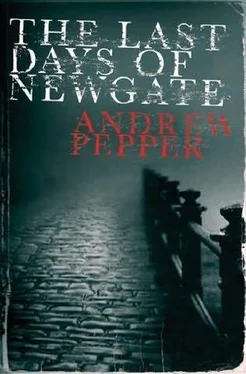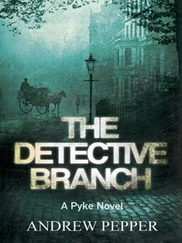Andrew Pepper - The Last Days of Newgate
Здесь есть возможность читать онлайн «Andrew Pepper - The Last Days of Newgate» весь текст электронной книги совершенно бесплатно (целиком полную версию без сокращений). В некоторых случаях можно слушать аудио, скачать через торрент в формате fb2 и присутствует краткое содержание. Жанр: Исторический детектив, на английском языке. Описание произведения, (предисловие) а так же отзывы посетителей доступны на портале библиотеки ЛибКат.
- Название:The Last Days of Newgate
- Автор:
- Жанр:
- Год:неизвестен
- ISBN:нет данных
- Рейтинг книги:4 / 5. Голосов: 1
-
Избранное:Добавить в избранное
- Отзывы:
-
Ваша оценка:
- 80
- 1
- 2
- 3
- 4
- 5
The Last Days of Newgate: краткое содержание, описание и аннотация
Предлагаем к чтению аннотацию, описание, краткое содержание или предисловие (зависит от того, что написал сам автор книги «The Last Days of Newgate»). Если вы не нашли необходимую информацию о книге — напишите в комментариях, мы постараемся отыскать её.
The Last Days of Newgate — читать онлайн бесплатно полную книгу (весь текст) целиком
Ниже представлен текст книги, разбитый по страницам. Система сохранения места последней прочитанной страницы, позволяет с удобством читать онлайн бесплатно книгу «The Last Days of Newgate», без необходимости каждый раз заново искать на чём Вы остановились. Поставьте закладку, и сможете в любой момент перейти на страницу, на которой закончили чтение.
Интервал:
Закладка:
‘Godfrey,’ Pyke shouted, louder this time. Still, though, the figure ahead of him did not look up.
Pyke moved quickly towards him, both concerned and irritated. As he did so, he did not think to look behind him. That was his second mistake. His first was to imagine that his uncle had not been followed. Still wheezing, Godfrey dismissed Pyke’s attempts to help him but managed to utter, ‘I’m sorry, I really am sorry.’ Godfrey could have been sorry for a gamut of reasons but instinctively Pyke knew what he was referring to. Godfrey thrust a pile of banknotes into Pyke’s outstretched hand but Pyke did not need his uncle to explain that ‘they’ had made him do it, in order to work out for himself what was happening. By this point, Pyke had already turned around and broken into a run, ignoring the shouts of the battalion of constables who had gathered to block his escape to the north side of the river. For ten or twenty yards, Pyke sprinted as a hunted fox would run, motivated only by fear and an instinct for self-preservation. But while he had expected, and even planned for, his route across the bridge to the north bank to be blocked, he had not for a moment imagined there might be constables amassed at its southern end.
Trying not to panic, he took a deep breath, while he considered his options. He looked at the massed ranks of constables, two or three thick across the bridge and gingerly closing in on him. Could he force his way through this human barricade? It did not appear likely. Nor did he think he would survive jumping from the bridge; if he did not drown, the icy waters of the Thames would kill him. Briefly, he cursed himself for not bringing some sort of weapon, a knife or a cudgel. Ahead and behind him, the two lines of constables edged warily towards him, as though they had cornered a wounded but dangerous animal. One of them yelled, ‘Give yourself up, Pyke. There’s no way through us.’ The man sounded as nervous as Pyke felt. Dizziness swept over him. There was only one option left. Closing his eyes, he launched himself at one of the advancing lines; as he did so, he unleashed a blood-curdling scream. Pyke did not know what he screamed but it emanated from the bottom of his stomach and propelled him forwards into the startled constables at such a speed that, for an instant, he thought he might just break through their ranks and earn his freedom.
Then he took a heavy blow to his head, and another to his upper body, and felt his legs buckle, and the next thing he remembered was a bearded man with cheese-and-onion breath hunched over him, shouting that he was being arrested for the murder of Lizzie Morgan, while two other men applied leg-irons and handcuffs.
As he lay there on the bridge, panting, he didn’t feel a thing: neither regret nor sadness nor loss, just a gaping emptiness that was one heartbeat away from death.
ELEVEN
The office at Great Marlborough Street magistrates’ court, once the parlour of a private house, was too small for its current function: hosting an examination into the evidence against Pyke in order to determine whether there was a case to be answered in a higher court. Because he had been accused of a capital crime, the ‘higher court’ meant the Sessions House on Old Bailey. In normal circumstances, the room might still have been too small, but in the light of the feverish interest that Pyke’s trial had generated, its size seemed even more diminished. It was not a grand room, by any stretch of the imagination: the blackened walls and ceilings and the oppressive smell made it seem more like a public house than a court of law. It was certainly shabbier than the corresponding office at Bow Street but the examination was being held at Great Marlborough Street on the insistence of the Home Office. Rightly, they felt that Pyke would receive a more favourable hearing from Sir Richard Fox than he would from any of the magistrates at Bow Street.
The office was choked with all manner of spectators. From the dock, an elevated platform fenced off by a wooden rail facing the magistrates’ bench, Pyke watched as a line of eminent society figures took up their seats next to James Slingsby Bodkin, who was in charge of the hearing. He recognised Sir Henry Hobhouse, the retired Home Office under-secretary and a friend of Peel, the radical writer John Wade, and someone who resembled Edmund Kean, the famous thespian. Beneath the bench, the room was thronging with less salubrious types: people who had queued through the night for the chance to see one of their own — one who had risen too far above his station — take a fall.
The fact that the working poor often sided with the pick of society never failed to surprise him.
But it was a spectacle, not a committal hearing.
Pyke did not have any doubt about the verdict or what would happen during the hearing itself: the coroner’s report would be read out, witnesses would be allowed to give their evidence (especially ones whose words might incriminate him), expert testimony about Pyke’s character would be aired, the prosecution counsel would lay out the evidence against him and Pyke would have a chance to refute the claims and challenge any of the prosecution’s witnesses.
Bodkin would talk about the seriousness of the crime and the gravity of the evidence stacked against Pyke. He would ask Pyke whether he wished to say anything in his defence and when Pyke said nothing — as he planned to — the man would look around him at the packed office and then fix his gaze on Pyke and say in his small, affected voice, ‘Accused, you will be committed to Newgate to take your trial at the ensuing sessions commencing on the twentieth day of March eighteen hundred and twenty-nine for the willing, cold-blooded murder of Elizabeth Morgan on the night of the fourth day of March eighteen hundred and twenty-nine in a drinking establishment on Duke Street in the Smithfield area of London.’
Pyke would say nothing in his defence, both in order to disappoint the expectant crowd and to rile Bodkin and the prosecution counsel, who, like all prosecution counsels, expected to use the committal hearings to elicit incriminating statements from the accused. He would also say nothing because it would hasten the court’s proceedings.
If Pyke had no doubt he would be found guilty, however he conducted himself in court, what was the point of holding things up?
This way, he would be committed to a ward in Newgate prison by nightfall, from where he would be able to plan his next move, even as the forces of the criminal justice system were being marshalled against him. The grim irony of the gaoler being jailed was not lost on him, nor was he under any misapprehension about the real dangers he faced from elements within Newgate itself. If Pyke survived the first night, then perhaps he had a chance.
Chained by the hands and feet, Pyke was led by a turnkey through what seemed to be a never-ending maze of damp, narrow passages, illuminated only by occasional lanterns affixed to the walls. Periodically their progress was halted by heavy-set doors which were unbolted and opened in order to let them pass through. The sound of clanking iron drowned out the muffled shouts from the belly of the prison, but it was by no means a reassuring noise. As a Bow Street Runner, Pyke had heard numerous stories about Newgate. Sane men had become crazed within these walls; people had disappeared, never to be seen again; virile specimens had emerged from even short periods of incarceration as broken-down wrecks. Pyke, however, had more pressing concerns to address, and it did not surprise him that when he was led into the ward, his gaze fell upon Flynn, the receiver.
Evidently Flynn had been waiting for him, and the man’s thin smile indicated that he had no intention of passing up this opportunity to exact his revenge, even if the man had tried to double-cross Pyke and therefore deserved his come-uppance.
Читать дальшеИнтервал:
Закладка:
Похожие книги на «The Last Days of Newgate»
Представляем Вашему вниманию похожие книги на «The Last Days of Newgate» списком для выбора. Мы отобрали схожую по названию и смыслу литературу в надежде предоставить читателям больше вариантов отыскать новые, интересные, ещё непрочитанные произведения.
Обсуждение, отзывы о книге «The Last Days of Newgate» и просто собственные мнения читателей. Оставьте ваши комментарии, напишите, что Вы думаете о произведении, его смысле или главных героях. Укажите что конкретно понравилось, а что нет, и почему Вы так считаете.












